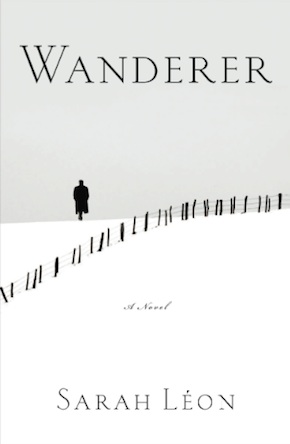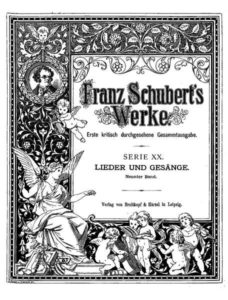Fantasia in F minor
by Sarah Léon
“An atmospheric, delicately wrought study of misunderstood emotion, heartbreaking yet incisive.” Library Journal
Breathless, they sank into the armchairs in the Great Room. While Lenny, shaken by a new coughing fit, gasped for air, Hermin began a feverish search for a subject, any subject, capable of guaranteeing a normal conversation. The silence must not be allowed to drag on and on again; topics of an oversensitive nature must not be brought up… Suddenly, he felt an object in his pants pocket – the cassette he’d found a short time before – and he was saved; they needed only to listen to it.
He showed the object to Lenny and said, “All right with you if we see what this is?”
“If you want…” Lenny replied, shrugging his shoulders.
Without waiting for any further comment, the young composer inserted the cassette in the player. A disturbing crackling sound issued from the speakers. “The humidity hasn’t done it any good…”
The static stopped; notes could be heard.
The memory came back to Hermin immediately: a rehearsal of Schubert’s Fantasia in F minor, a piece for four hands that he and Lenny had started to work on before eventually abandoning the effort. In the last months of his life, Schubert lived with his friend Schober, and Hermin had always wondered whether that fact hadn’t given rise to the late outpouring of works for four hands – the Fantasia, an Allegro, a Rondo, a Fugue – in a sort of amicable communion that functioned as a substitute for the pipe dream of a romantic collaboration.
We would play music together in the garret, sitting side by side on the threadbare velvet of the old piano bench, which creaked and groaned with every movement we made; our shoulders would touch, and so would our legs. Without regret, I’d let Lenny take the high part, which he exalted with his singing sound, by turns sorrowful, violent, thin, panting; as for me, I provided muted accompaniment, trying to disguise, as best I could, my deficiencies: I hadn’t done much work on the piece and didn’t possess the instantaneous sight-reading ability, no doubt innate in the greatest players, of which Lenny gave daily, dazzling proof. Nonetheless, I used to love playing with him…
“I used to love playing with you,” the young man suddenly said, his voice toneless, his eyes fixed on the window adorned with frost. “Yes, I used to love that…”
“We could start again – it’s up to you. I’m ready.”
Lenny raised his head. For an instant, the light that enlivened his pupils thrust into Hermin’s eyes like a lance piercing a breastplate. Then, just as rapidly, he turned away.
“Let us not talk about it. You must not insist…”
Then he stopped speaking. The development of Schubert’s theme, now in a major key, was proceeding apace, and the melody, Hermin’s skirmishing in the bass register, the tape hiss in the cassette, and their twinned breathing resounded indiscriminately in the room.
“Do you hear?” Lenny went on when their eyes met again.
Their mingled breathing functioned as a sort of symbol for their former connection… for the bond to which the young composer today hesitated to give the beautiful name of friendship.”
The question might have seemed strange; however, from the young man’s intonation, from his furtive glance, Hermin understood, beyond any possibility of error, what Lenny was alluding to. He himself hadn’t stopped paying attention to it, not since the very start. Their mingled breathing functioned as a sort of symbol for their former connection, for what united them back then, for the bond to which the young composer today hesitated to give the beautiful name of friendship, although he could think of no more fitting term.
“You can hear Gould breathing too, in his recording of the Goldbergs,” Hermin said. “You can even hear him singing,” he added in a strangled voice, well aware that Lenny wouldn’t be fooled by these beside-the-point reflections.
Suddenly, their listening to that cassette together seemed oddly reckless to Hermin. It was better not to exhume certain buried emotions.
“I know… but that is not exactly what I mean… Does not matter anyhow.”
At the same instant, ten years earlier, they attacked a forte passage; Lenny was faultlessly executing chords and broken arpeggios, while Hermin was wrestling with the particularly convoluted accompaniment. Soon he settled for playing the theme in the bass, more or less in time. Suddenly, Lenny’s voice, hardly distorted at all, erupted from the speakers, crying out in a tone full of reproach: “Hermin!”
Back then, Lenny’s accent was still quite heavy, and he pronounced his friend’s name almost as Herman, a mistake that amused Hermin.
“Hermin! You are spoiling the best passage!”
“I’m doing the best I can!”
Hermin recalled the scene. In an incredible effort, he’d tried and succeeded – for three measures – to play all the notes with his right hand before realizing that by doing so he’d slowed down, with the result that he and Lenny were out of sync. Discouraged, Hermin had stopped altogether.
“Hermin! Why?”
“Turn it off,” twenty-seven-year-old Lenny said in a low voice. He was clenching his fists so hard that his knuckles had turned white and his fingernails were digging into his flesh. “Now I remember that day. We had an argument. I do not feel like listening to that.”
But Hermin, strangely fascinated by those voices risen from the past, didn’t stop the tape.
“Forgive me… We’re not at the same level anymore, and you know it!”
“That is not important. Once more, from the beginning of the forte…”
“It’s no use. Look, Lenny, you’re going to have to get used to this idea: we can’t play together anymore… I can sight-read simpler things, but this…”
“You can do anything if you work at it. Let us try it again, Hermin…”
His voice was practically pleading when he said Hermin’s name.
And his eyes likewise, ten years later, imploring Hermin to stop the cassette.
“No. Lenny, we may as well have this out once and for all. I’ve tried my best to help you progress, but now there’s nothing more I can do for you… If you want to make the piano your profession, you need to be taught by a master. With me, you’re picking up bad habits. I’m holding you back more than helping you!”
“Even if that is true… it does not mean we cannot play together!”
“I can’t just play this piece at the drop of a hat – I’d have to work on it for hours and hours – and I don’t have the time! What would you say if I handed you my cello and demanded we play a sonata together?”
“Maybe I could not do it, but I would try!”
“Oh, stop. In any case, I have to go out. If you insist, we can take up the piece again another day…”
Lenny got up. “You like listening to this?” he asked harshly, almost aggressively. “I should have known… You liked it when we argued…”
“The hell I did!”
“You liked it, I tell you! For me, every argument was pain, but you, you loved that, admit it, you loved our ugly cat-and-dog fights!”
Hermin, wounded by those words – whose justice he was able to glimpse – didn’t answer and went back to listening. During the few seconds when they’d stopped paying attention to the recording, their conversation had grown remarkably heated.
“Go ahead, I do not care!” Lenny cried. “Please… let’s be reasonable, let’s not get all upset for nothing…”
“I do not feel like being reasonable! Hermin… I thought you liked working with me… But I was wrong, I sure was! I am the ‘boy wonder’ you want to launch for your own glory… You could not care less if we play together or not!”
“You don’t know what you’re talking about!”
They heard Lenny burst into bitter laughter.
“Oh, yes I do! Hermin Peyre, the great discoverer… I am sure it is the same for Iris too, and for others I do not know… So look, tell me, how many discoveries did you make before me?”
“Lenny, you’re crazy!”
“I hope you’re not still stuck on that idea,” Hermin broke in, bewildered.
The beginning of a smile appeared on Lenny’s lips. “I was angry, I did not really think that… Actually, I do not know…”
“Lenny!” Hermin exclaimed.
For a moment, they struggled in silence. In defiance of all logic, Hermin was determined to listen to the recording all the way to the end.”
But he was interrupted by the sound of a slap that echoed across the years.
“Who hit who?” he wondered, in an almost inaudible voice.
“You slapped me,” Lenny answered.
A slamming door resounded in its turn.
“That was me leaving, no doubt,” Hermin murmured.
Lenny agreed, biting his lip. The young composer saw him move to stop the tape and grabbed him by the wrist. For a moment, they struggled in silence. In defiance of all logic, Hermin was determined to listen to the recording all the way to the end.
Ten years before, alone in Hermin’s garret, Lenny was crying. For a few seconds, they listened to his sobs. The young man had given up the idea of turning off the cassette.
Then silence fell – either because teenage Lenny had thought to stop the tape, or because the tape had run out on its own.
They looked at each other, ashen-faced. Before that evening, Hermin had never imagined that Lenny could cry.
“Do you remember that?” Hermin asked.
The young man didn’t respond; any response would be useless.
After a pause, he asked hoarsely, “Can I see the cassette?”
Without a word, Hermin ejected the tape, removed it, and handed it over. Lenny held it in the palm of his hand. He remained unmoving for an instant, standing upright, his face illuminated by the flames, which bent like grasses in a big wind. Then, abruptly, he made a movement, his arm remained suspended a moment – Hermin repressed a cry – the cassette was already in the fire.
from Wanderer, translated from the French by John Cullen, by permission of Other Press © 2019 Sarah Léon
 Sarah Léon was born in 1995 and studied literature and musicology at the École normale supérieure in Paris. She won the 2012 Prix Clara for her novella Mon Alban. Wanderer, her debut novel, is published in paperback and eBook by Other Press.
Sarah Léon was born in 1995 and studied literature and musicology at the École normale supérieure in Paris. She won the 2012 Prix Clara for her novella Mon Alban. Wanderer, her debut novel, is published in paperback and eBook by Other Press.
Read more
Buy at Amazon UK
Author portrait © Gérard Cambon/Éditions Héloïse d’Ormesson
John Cullen is the translator of numerous books from Spanish, French, German and Italian, including Philippe Claudel’s Brodeck’s Report, Yasmina Reza’s Happy Are the Happy, Juli Zeh’s Decompression, Chantal Thomas’s The Exchange of Princesses and Kamel Daoud’s The Meursault Investigation. Originally from New Orleans, he lives in upstate New York.


